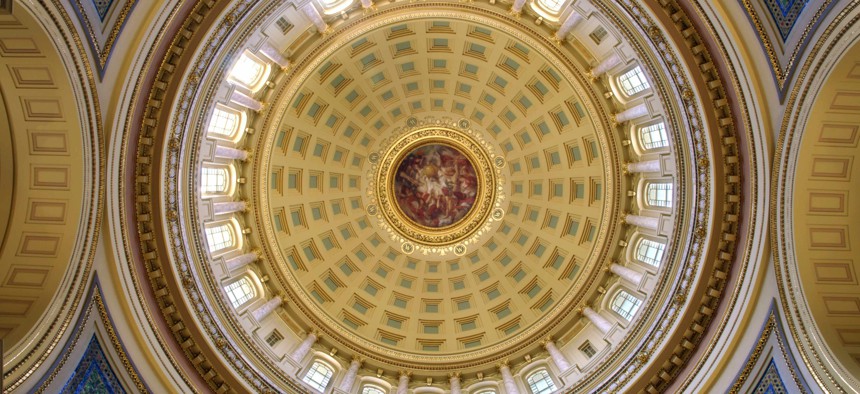A State Opts to Use Added Online Sales Tax Revenue to Offer Income Tax Cuts

The rotunda inside Wisconsin's state capitol building. Shutterstock

Connecting state and local government leaders
Wisconsin will soon begin collecting sales taxes from companies that provide online marketplaces for other vendors.
Wisconsin is one of the latest states to require businesses like Amazon and eBay to collect and submit taxes on sales made by third-party sellers who are not part of the companies that run these sorts of online marketplaces but use the platforms to reach consumers.
The state plans to use the proceeds from its online sales tax collections to provide individual income tax relief targeted toward the state’s lowest two marginal tax brackets. In the state’s 2020 tax year, it’s estimated the decrease in income taxes will total about $136 million.
Gov. Tony Evers, a Democrat, last week signed legislation into law that includes the provisions.
Besides Wisconsin, at least 33 other states and the District of Columbia had policies on the books as of July 1 that require certain “marketplace facilitators” to collect sales taxes on third-party transactions, according to the National Conference of State Legislatures.
States around the country have taken new action to capture more sales taxes from out-of-state online vendors in the wake of a landmark U.S. Supreme Court ruling last year that scrapped legal precedents that had previously made it difficult for them to do so.
Wisconsin enacted legislation last year focused on collecting taxes on sales made by out-of-state online vendors into the state. That measure, however, did not include language tailored toward collecting taxes on sales by third-party vendors through online marketplaces.
The legislation adopted last year also earmarked sales tax revenues coming from out-of-state online retailers for income tax relief. But it left doubts about whether the cuts would go beyond 2019. The new measure extends the reductions into future years.
Another change under the new law is that the revenues are divided to provide income tax rate reductions for the state’s bottom two marginal tax brackets, which for married filers in 2019 were 4% for income up to $15,680 and 5.84% on income up to $31,360.
The old law applied the reductions proportionally across all four of the state’s income tax brackets.
The new one is expected to shave about 0.24% off of the bottom tax bracket rate and 0.28% off of the second lowest rate beginning in 2020, according to the state’s Legislative Fiscal Bureau. Taxpayers receiving the reduction in 2020 would see an average tax decrease of $59.
Staffers told lawmakers last month that about $69 million of revenues to offset the income tax cuts are expected in tax year 2020 from standard online sales tax collections, while another $67.1 million are expected to flow from marketplace providers.
Evers has said the tax reductions from the legislation, along with other tax cuts included in the state’s latest budget, total about $500 million.
For year fiscal 2018, the state reported about $9.4 billion in total income tax collections and about $37.7 billion in total revenues.
Bill Lucia is a Senior Reporter for Route Fifty and is based in Olympia, Washington.

NEXT STORY: A Nationwide $15 Minimum Wage Could Have Mixed Results





